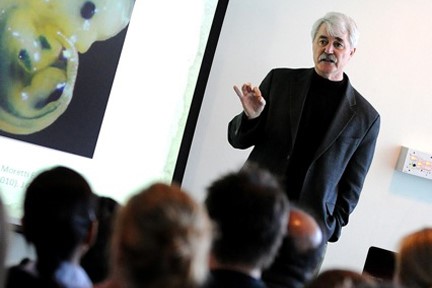How to test our way to a safe environment

Dr. R. Thomas Zoeller, Emeritus Professor of Biology at the University of Massachusetts Amherst
We are proud to have Dr. R. Thomas Zoeller, Emeritus Professor of Biology at the University of Massachusetts Amherst as part of our programme committee this year! Dr. Zoeller is also co-organizer of a workshop at our summit, together with Dr. Ida Hallberg from the Swedish University of Agricultural Sciences. Their workshop delves into the important theme of Testing of chemicals. Read the interview with Dr. Zoeller to learn more!

Dr. R. Thomas Zoeller, Emeritus Professor of Biology at the University of Massachusetts Amherst
What are Endocrine Disrupting Chemicals (EDCs) and can exposure to them affect human health?
Endocrine Disrupting Chemicals, or EDCs, are chemicals manufactured for commercial purposes like making plastics, or flame retardants, etc., but that also interact with hormone systems in people and animals. The Endocrine Society, headquartered in Washington DC but with members all over the world, defined an EDC as an exogenous chemical, or mixture of chemicals, that interferes with any aspect of hormone action. Most EDCs are petrochemicals like Bisphenol A (or BPA), pesticides, phthalates and others. There are some natural chemicals that can interfere with hormone systems, but they only cause a problem when they are highly purified or when people eat a steady diet of them", says Dr R. Thomas Zoeller, Emeritus Professor, University of Massachusetts Amherst; Visiting Professor, Örebro University.
EDCs can have a variety of effects depending on the hormone system they interfere with. For example, many chemicals can cause a decrease in blood levels of thyroid hormone. If this occurs in a pregnant woman, the offspring is at risk of having cognitive deficits because thyroid hormone of maternal origin is essential for normal brain development in the fetus. The chemical BPA can interfere with the insulin system that controls blood sugar levels. As a result, this can lead to metabolic disorders. Chemicals that interfere with the hormone estrogen can increase the risk of breast cancer in women and prostate cancer in men. The World Health Organization published a major review of the health effects of EDCs in 2013. Nearly all major hormone systems can be affected by manufactured chemicals.
How come you decided to focus you research on this field?
I trained in the field of neuroendocrinology. This field focuses on how the brain controls hormones in the body. For example, reproductive functions like ovulation and sperm production are controlled by so-called "neuropeptides" produced by specific neurons in the hypothalamus of the brain that act on the pituitary gland, which in turn controls the gonads. Likewise, the thyroid gland and the adrenal glands are controlled by separate neuropeptides produced by other neurons in the hypothalamus. With this background, the US EPA invited me to participate in the Endocrine Disruptor Screening and Testing Advisory Committee in the mid 1990s. This was my first introduction to the topic and after a year and a half of almost monthly discussions, I realized how important this topic was. As a result, I turned my lab in this direction", says Dr. R. Thomas Zoeller.
What would need to happen for you to feel that the world is on the right track to tackle this issue?
At this moment, different regulatory agencies in the world can have a dramatically different estimate of the safe level of a chemical. A good example is the EFSA (the European Food Safety Authority) has proposed to reduce the estimate of safety for BPA by 20,000 fold. In contrast, the US EPA, Germany's BfR, the European Medicines Agency, and the UK's Health England all disagree. And their disagreement is largely based on technicalities. I don't think that agencies agree on the kinds of health outcomes they should be protecting their populations from. A good start to be on track is to have an agreement that chronic disease is an important outcome of chemical exposures. Debate about the best way to protect the human population would then be productive", says Dr. Zoeller.
Why is your workshop at the summit focusing on chemical testing?
For new chemicals being planned for market release, testing is the gateway to identify safer products. In principle, these tests will determine whether the chemical itself has the ability to cause harm to human health or the environment. Will the chemical cause cancer? Will it affect human development or reproduction? Might the chemical cause metabolic disorders or obesity? This is a very complicated issue and chemical manufacturers and regulators are challenged more than ever to ensure the safety of their chemicals through a testing program before release into the market. For chemicals currently on the market, testing supplements basic science including academic and epidemiological studies to identify hazardous chemicals that affect human health, leading to restrictions or removal from the market. As a result, testing - and the interpretation of data resulting from these tests - is critical", says Dr. R. Thomas Zoeller.
What is your expectations on Uppsala Health Summit?
The Summit will include experts working at different different levels of this field -- epidemiologists, regulators, industry toxicologists and more. My expectation is that we can clearly identify similarities and differences in perspectives about how to protect human health while at the same time providing products for the modern world. Only if we honestly debate the perspectives that lead to policies will we be able to create a safer world", says Dr. Zoeller.
Thank you Dr. Zoeller!
